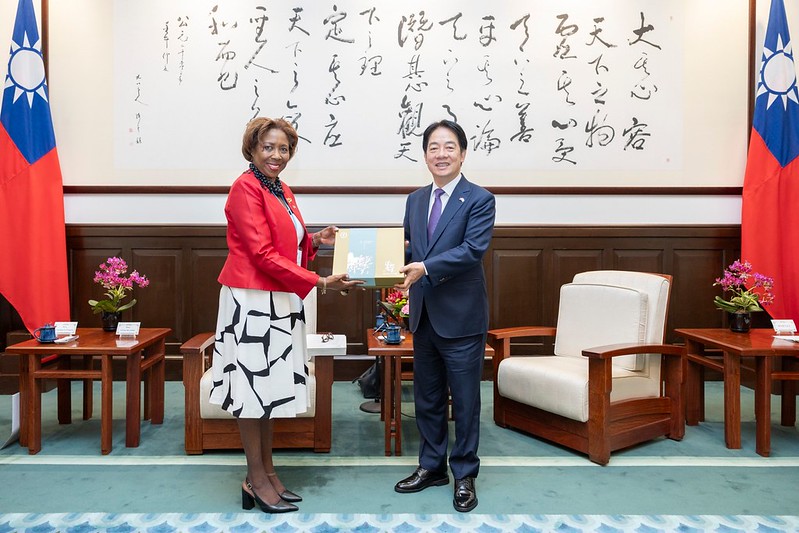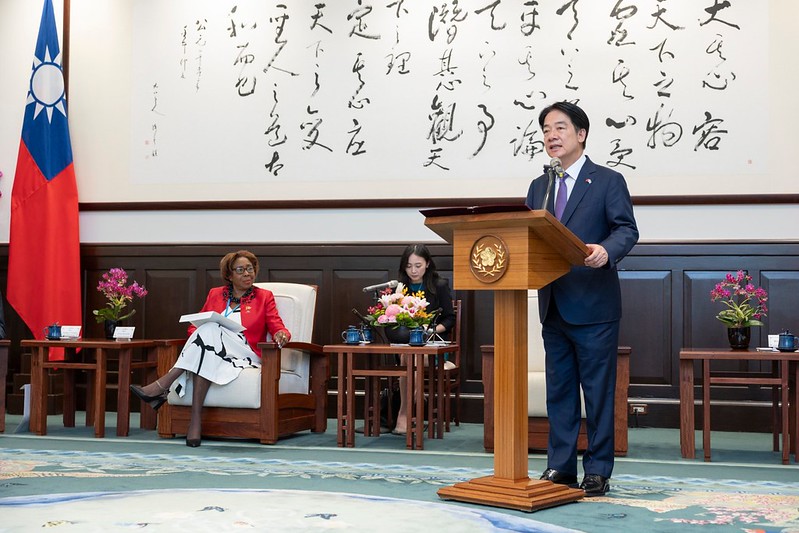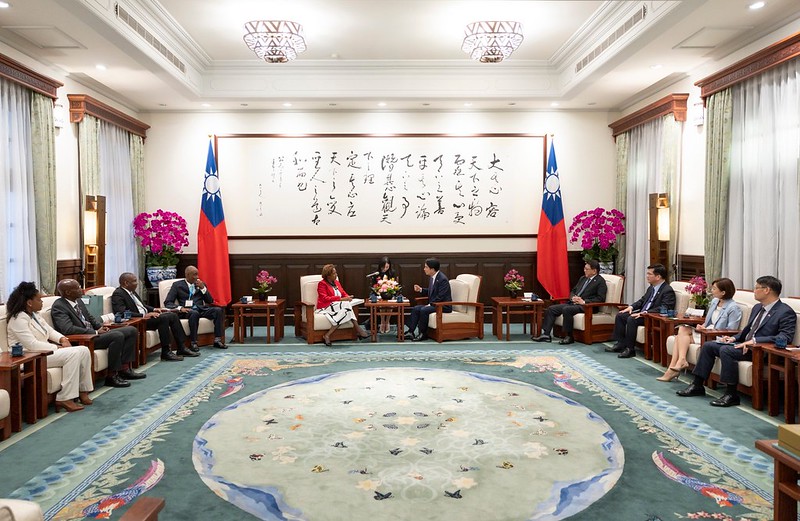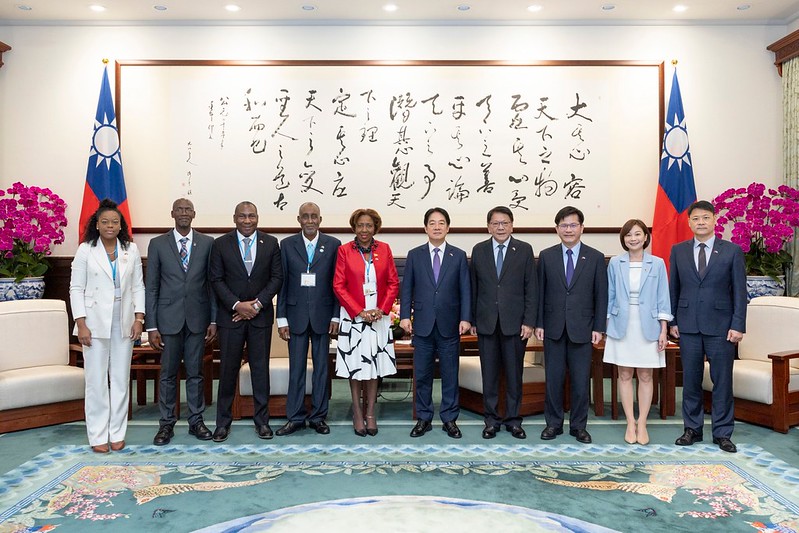News & activities
 News releases
News releases
On the morning of October 8, President Lai Ching-te met with a delegation led by Senate President Alvina Reynolds and Speaker Claudius J. Francis of Saint Lucia. In remarks, President Lai thanked the delegation for joining us to mark our National Day celebration, demonstrating the friendly relations between the governments and parliaments of our two countries. The president noted that Saint Lucia is one of Taiwan’s key allies in the Caribbean, and that over the years, our diplomatic alliance has continued to deepen as our bilateral cooperation in several areas has yielded fruitful results. He stated that going forward, Taiwan will continue to promote values-based diplomacy and economic diplomacy, and he expressed his hope that we will continue to enhance the well-being of our peoples and contribute more to global peace and prosperity.
A translation of President Lai’s remarks follows:
I extend a warm welcome to Senate President Reynolds and Speaker Francis as they visit Taiwan once again. It is a pleasure to have you and your delegation join us to mark our National Day Celebration. Your presence demonstrates the friendly relations between the governments and parliaments of our two countries.
Saint Lucia is one of Taiwan’s key allies in the Caribbean. It has continued to voice support and call for Taiwan’s international participation at numerous international venues, including the Central American Parliament and the General Debate during this year’s United Nations General Assembly. I would like to take this opportunity to express my sincere thanks to the government and parliament of Saint Lucia.
Taiwan and Saint Lucia share such universal values as freedom, democracy, and the rule of law. Over the years, our diplomatic alliance has continued to deepen. At the same time, bilateral cooperation in such areas as the economy, agriculture, and education has yielded fruitful results. In working toward post-pandemic economic recovery, Taiwan and Saint Lucia have cooperated on promoting vocational training and empowerment projects for women and the youth. This has helped enhance industrial processing technology, boosted the competitiveness of goods, and created even more job opportunities.
Furthermore, with regard to the cultivation of talent, Taiwan’s youth ambassadors visited Saint Lucia last year and shared their experiences with local students. I thank Senate President Reynolds and Speaker Francis for their warm reception of our students. And I believe that the ongoing promotion of bilateral projects designed to nurture talent will facilitate even more cooperation and exchanges.
In closing, I want to thank you all for your longstanding support for our diplomatic relations. Going forward, Taiwan will continue to promote values-based diplomacy, strengthening ties with Saint Lucia. We will also engage in economic diplomacy, spurring further industrial development together with our democratic partners and Saint Lucia for the benefit of our peoples. Let us move forward together as we continue to enhance the well-being of our peoples and contribute more to global peace and prosperity.
Senate President Reynolds then delivered remarks, first extending greetings to President Lai from the government, people, and members of parliament of Saint Lucia. She extended sincere congratulations to President Lai on his election success, expressing her confidence that he will lead this great country into realizing greater success.
Senate President Reynolds remarked that it is her distinct honor to be back in our beautiful country once again, this time to join with us as we celebrate our 113th anniversary of National Day. She noted that they celebrate our great advancements in education, technology, trade and manufacturing, community development, health and wellness, arts and culture, climate, smart agriculture, sustainable development, and our values in diplomacy.
Senate President Reynolds pointed out that their visit is more than a symbol of the warm and friendly relations that Taiwan and Saint Lucia have enjoyed for many years; it is also a celebration and a reaffirmation of the deep diplomatic bonds that have existed between our peoples. Over the years, this partnership has significantly impacted the lives of Saint Lucians, especially the women, children, and persons with disabilities who are the most vulnerable among them.
On behalf of Prime Minister Philip J. Pierre and the government and people of Saint Lucia, Senate President Reynolds offered their profound gratitude for Taiwan’s kind generosity over the years. She added that as Taiwan prospers and shares selflessly with the rest of the world, Saint Lucia has also benefited. Taiwan’s kind gestures, she noted, contribute to improving the lives and livelihoods of so many Saint Lucians.
As a former minister for health and member of parliament in Saint Lucia, Senate President Reynolds said that she was able to see firsthand the significant contributions that Taiwan has made and continues to make to Saint Lucia’s health sector. This includes, she said, the scholarships Taiwan offers to many young Saint Lucians to pursue studies in the field of medicine. She added that Taiwan has also offered opportunities for biomedical, health promotion, and health technology training, and that it has given professional assistance for the prevention and control of non-communicable diseases.
In closing, Senate President Reynolds once again expressed gratitude to the people of Taiwan. Stating that she looks forward to us continuing to work together for the further growth and development of the peoples of Saint Lucia and Taiwan, she wished Taiwan a happy National Day.
Speaker Francis then delivered remarks, saying that he is honored to extend heartfelt congratulations to President Lai on his election as president. He said he is confident that in assuming this role of leadership, President Lai will guide our nation toward prosperity, peace, and progress. The speaker noted that Taiwan has long been a beacon of democracy, innovation, and resilience, and that it is a shining example to nations across the globe. He added that our strides in areas such as technology, healthcare, and sustainable development have not only elevated Taiwan’s standing but have also inspired admiration and respect worldwide.
Speaker Francis expressed gratitude on behalf of the government and people of Saint Lucia for the unwavering support that Taiwan has extended to their nation. Through partnerships in healthcare, education, agriculture, and infrastructure, Taiwan has stood by them, he said, fostering growth and enriching the lives of all Saint Lucians. He emphasized that Taiwan’s generosity and friendship have made a tangible difference in Saint Lucia, enabling them to achieve significant milestones and overcome challenges together. That spirit of collaboration between our two nations, he noted, serves as a testament to the enduring bonds of solidarity and shared values that unite us.
Speaker Francis stated that the resilience and determination demonstrated by Taiwan in the face of global challenges exemplify the spirit of leadership and compassion that defines a true partner on the world stage. The speaker expressed his hope that we will reaffirm our commitment to working hand in hand towards a brighter, more inclusive future for both of our countries, and that together we can forge paths of progress, equity, and sustainability that leave a lasting impact on generations to come. He then expressed his wish for our partnership to continue to flourish, nurturing a legacy of friendship for both Taiwan and Saint Lucia.
Also in attendance at the meeting was Saint Lucia Senator Embert Charles. The delegation was accompanied to the Presidential Office by Saint Lucia Ambassador Robert Kennedy Lewis.












